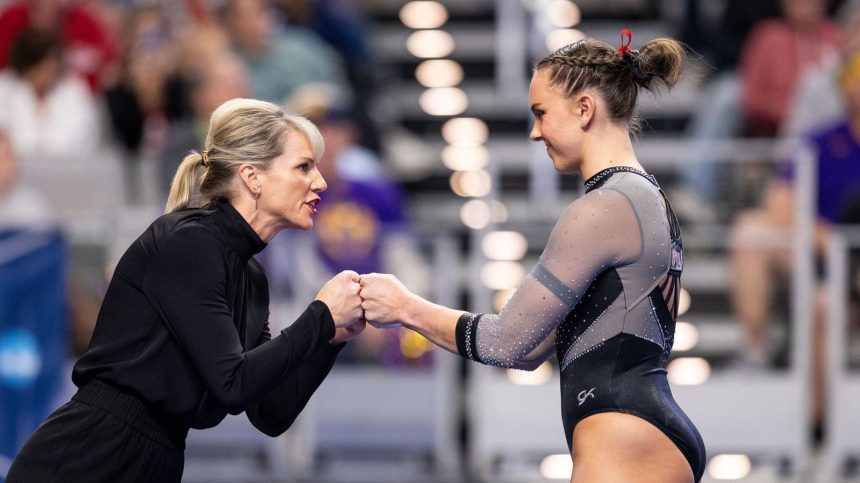The 2025 NCAA gymnastics season debuted with a bang, featuring heightened scrutiny on judging and a new avenue for coaches to challenge perceived scoring injustices. The Sprouts Farmers Market Collegiate quad meet, a preview of the National Championship contenders, saw the ten-time National Champion Utah Red Rocks take an unexpected fourth place, their sub-197 score a stark contrast to the performances of top-ranked Oklahoma, defending champions LSU, and national runner-up California. While the final standings weren’t the primary source of contention, the perceived undervaluing of Utah’s routines sparked controversy and highlighted the evolving landscape of NCAA gymnastics judging. This meet served as an early test of the newly implemented SCORE (System and Collegiate Officials Review and Evaluation) board, designed to address scoring inconsistencies and improve judging accuracy across the sport.
Utah Head Coach Carly Dockendorf voiced her discontent with the judging in a post-meet press conference, a move that deviated from the usual diplomatic stance adopted by NCAA coaches. Her comments, as reported by The Salt Lake Tribune, reflected the team’s frustration and bewilderment at the scores awarded. Dockendorf questioned the rationale behind certain scores, expressing her disappointment that seemingly well-executed routines weren’t adequately rewarded. This public expression of concern resonated with fans who echoed similar sentiments on social media, with many calling for the SCORE board to review the meet’s scoring. Fans pointed to perceived discrepancies in judging standards, accusing judges of potential bias towards SEC teams and highlighting the need for consistent application of deductions across all conferences and divisions.
The introduction of the SCORE board marks a significant shift in the power dynamic between coaches and judges. For the first time, coaches have a formal mechanism to challenge scores they deem unfair or inaccurate. Each team is allocated six routine summaries per competition, which they can submit to the SCORE board for review. This process allows for greater transparency and accountability in judging, potentially leading to the demotion of judges who consistently deliver questionable scores. Dockendorf confirmed that Utah utilized all six of their allotted summaries for the meet, underscoring the depth of their concern regarding the scoring. This new system promises to hold judges accountable and ensure fairness, but also raises questions about its potential for misuse and the impact on the flow and finality of competition results.
Dockendorf’s outspoken criticism, while unusual, is likely a harbinger of things to come. The 2025 season is a period of transition for NCAA gymnastics, with the new judging procedures and the SCORE board representing significant departures from the established norm. These changes, while intended to improve the integrity and consistency of judging, are bound to create friction as coaches, judges, and athletes adapt to the new system. The potential for subjective interpretation of routines and the inherent difficulty in quantifying athletic performance leaves room for disagreement and debate. The early weeks of the season will be crucial in determining how effectively the SCORE board addresses scoring discrepancies and whether it fosters greater trust and transparency in the judging process.
The Utah coach’s challenge to the scoring highlights a broader conversation about the evolution of judging in NCAA gymnastics. The increased emphasis on stricter deductions and the implementation of the SCORE board reflect a desire for greater precision and fairness in evaluating performances. However, these changes also bring new challenges. The potential for increased scrutiny of judging decisions could lead to a more cautious and conservative approach from judges, potentially impacting the dynamism and artistry of the sport. Finding the right balance between rewarding difficulty and execution while maintaining the artistic integrity of gymnastics will be a crucial task for the SCORE board and the judging community as a whole.
Moving forward, the focus will be on how the SCORE board responds to the initial wave of submitted summaries and whether its decisions lead to tangible improvements in judging consistency. While Dockendorf and the Utah team are understandably frustrated with the perceived scoring injustices, they also recognize the need to move forward and focus on improving their performance. The early season meets serve as valuable learning experiences, providing opportunities for teams to refine their routines and adapt to the evolving judging landscape. As the season progresses, the effectiveness of the SCORE board and its impact on the sport will become increasingly clear, shaping the future of NCAA gymnastics and potentially setting new precedents for judging in other collegiate sports.



